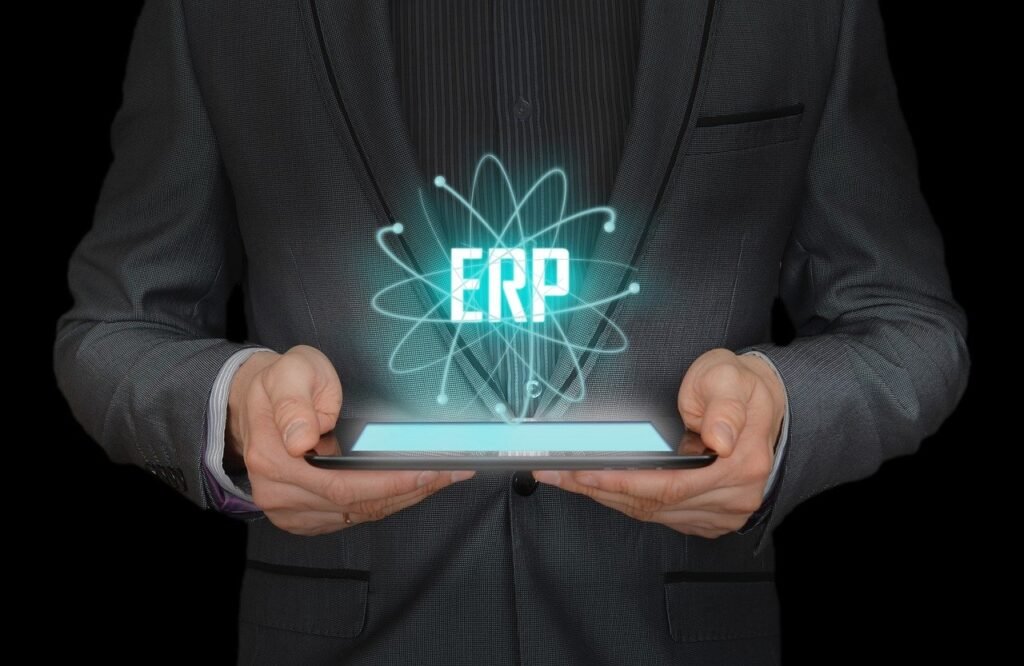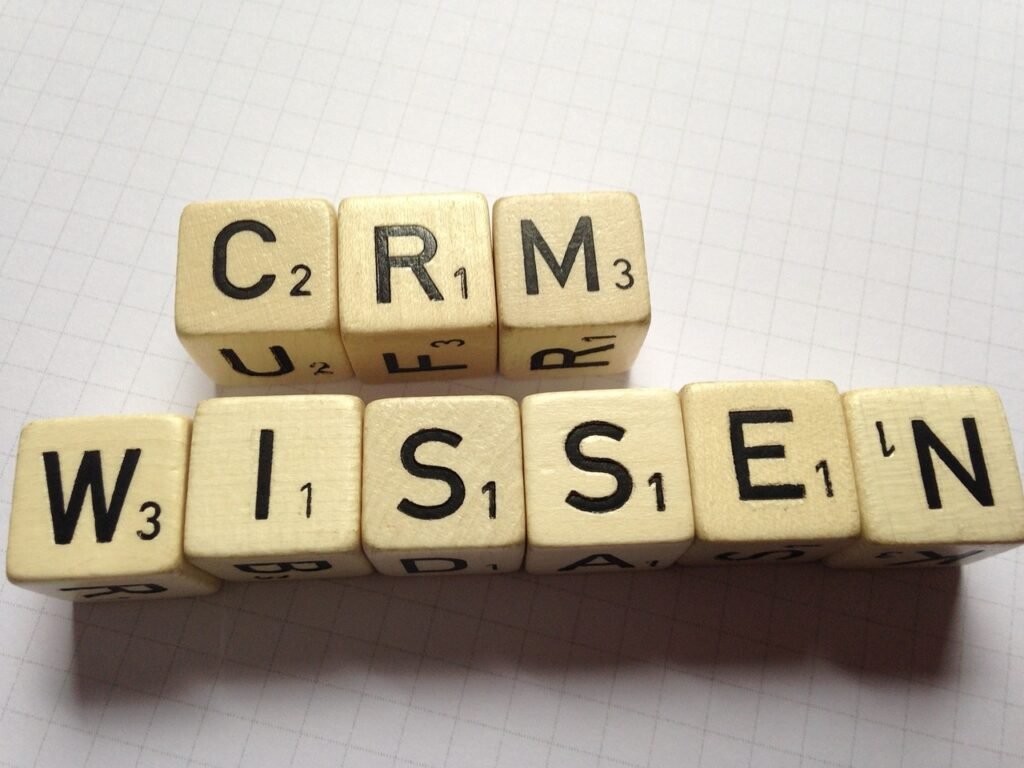Introduction: ERP vs CRM – An Overview

In the dynamic landscape of business technology, (ERP vs CRM) choosing the right software solutions can be a pivotal decision for companies seeking to enhance their operations and customer relationships. Two key players in this arena are ERP (Enterprise Resource Planning) and CRM (Customer Relationship Management) systems. While ERP systems focus on optimizing internal processes and data management, CRM systems are tailored to improving customer interactions and sales growth.
In this blog, we’ll delve into the differences between ERP and CRM (ERP vs CRM) systems, exploring their functionalities, data management capabilities, integration and compatibility features, customization and scalability options, as well as cost considerations and user experiences. By the end, you’ll have a clearer understanding of how ERP and CRM systems can benefit your business and which one might be the right fit for your specific needs.

Definition and Purpose: Understanding ERP vs CRM
In the realm of business technology, (ERP vs CRM)ERP (Enterprise Resource Planning) and CRM (Customer Relationship Management) are two key systems that play distinct yet complementary roles. Understanding the differences in their definitions and purposes is crucial for businesses aiming to streamline their operations and enhance customer relationships.
Enterprise Resource Planning (ERP)
ERP systems are comprehensive software solutions designed to integrate and manage core business processes such as finance, human resources, supply chain, inventory, and more. The primary purpose of an ERP system is to facilitate the flow of information between all departments within an organization, ensuring data consistency and providing a holistic view of the business operations.
Customer Relationship Management (CRM)
CRM systems, on the other hand, are focused on managing interactions with current and potential customers. The primary goal of a CRM system is to improve customer relationships by organizing, automating, and synchronizing sales, marketing, customer service, and technical support.
Key Differences in Purpose (ERP vs CRM)
While both ERP and CRM (ERP vs CRM)systems aim to improve business efficiency, their purposes differ significantly:
- ERP systems focus on optimizing internal processes and improving overall operational efficiency. They help streamline workflows, reduce costs, and enhance decision-making by providing real-time data and insights.
- CRM systems, on the other hand, focus on enhancing customer relationships and driving sales growth. They help businesses manage customer interactions, track leads, and personalize marketing efforts to improve customer satisfaction and retention.
Complementary Nature (ERP vs CRM)
Despite their distinct purposes, ERP and CRM systems are highly complementary(ERP vs CRM). Integrating ERP and CRM systems allows businesses to streamline operations across departments, improve data visibility and accuracy, and enhance customer experiences. For example, sales teams can access inventory data from the ERP system to provide accurate product availability information to customers, leading to better customer satisfaction and increased sales.
In conclusion, while ERP vs CRM systems serve different purposes, they are both essential for modern businesses looking to improve efficiency, streamline operations, and enhance customer relationships. Integrating these systems can lead to significant benefits and competitive advantages in today’s fast-paced business environment.
Scope of Functionality: Functionalities of ERP vs CRM
ERP (Enterprise Resource Planning) Functionality
ERP systems offer a wide range of functionalities that are essential for managing various aspects of a business. Some of the key functionalities of ERP systems include:
- Financial Management: ERP systems help businesses manage their financial operations, including accounting, budgeting, and financial reporting. They provide a centralized platform for tracking financial transactions and ensuring compliance with financial regulations.
- Supply Chain Management: ERP systems streamline supply chain processes by managing inventory, tracking shipments, and optimizing procurement. They help businesses reduce costs and improve efficiency in their supply chain operations.
- Human Resource Management: ERP systems include modules for managing employee information, payroll, benefits administration, and performance evaluation. They help businesses streamline HR processes and improve workforce management.
- Manufacturing and Production: ERP systems help businesses plan and control their manufacturing and production processes. They provide tools for managing production schedules, tracking work orders, and optimizing resource utilization.
- Sales and Marketing: While CRM systems are more focused on sales and marketing, ERP systems also offer some sales and marketing functionalities. They help businesses manage sales orders, track customer interactions, and analyze sales performance.
CRM (Customer Relationship Management) Functionality
CRM systems are specifically designed to manage customer interactions and improve customer relationships. Some of the key functionalities of CRM systems include:
- Contact Management: CRM systems help businesses organize and manage customer contact information, including names, addresses, phone numbers, and email addresses. They provide a centralized database for storing and accessing customer information.
- Sales Automation: CRM systems automate sales processes such as lead management, opportunity tracking, and sales forecasting. They help sales teams prioritize leads, track sales activities, and close deals more efficiently.
- Marketing Automation: CRM systems include tools for automating marketing campaigns, such as email marketing, social media marketing, and lead nurturing. They help businesses engage with customers effectively and generate leads.
- Customer Service and Support: CRM systems provide tools for managing customer service inquiries, tracking customer issues, and resolving complaints. They help businesses deliver exceptional customer service and support.
- Analytics and Reporting: CRM systems offer analytics and reporting features that help businesses analyze customer data, track sales performance, and measure marketing ROI. They provide insights that enable businesses to make informed decisions and improve their overall performance.
In summary, while ERP systems focus on managing internal business processes, CRM systems are dedicated to managing customer interactions. Both systems offer a wide range of functionalities that are essential for modern businesses looking to improve efficiency, streamline operations, and enhance customer relationships. Integrating ERP vs CRM systems can provide businesses with a comprehensive solution for managing their operations and improving their overall performance.
Data Management: Data Management in ERP vs CRM Systems

ERP systems are designed to manage large volumes of data from various business processes. The data managed by ERP systems includes:
- Financial Data: ERP systems manage financial data such as accounts payable, accounts receivable, general ledger, and financial reporting. They ensure that financial data is accurate, up-to-date, and compliant with financial regulations.
- Supply Chain Data: ERP systems manage supply chain data such as inventory levels, procurement orders, shipping schedules, and supplier information. They help businesses optimize their supply chain operations and reduce costs.
- Human Resource Data: ERP systems manage human resource data such as employee information, payroll records, benefits administration, and performance evaluations. They help businesses manage their workforce effectively and comply with labor regulations.
- Manufacturing Data: ERP systems manage manufacturing data such as production schedules, work orders, quality control records, and resource utilization. They help businesses plan and control their manufacturing processes efficiently.
- Sales and Marketing Data: While CRM systems focus more on sales and marketing data, ERP systems also manage some sales and marketing data. They help businesses manage sales orders, track customer interactions, and analyze sales performance.
CRM (Customer Relationship Management) Data Management
CRM systems are focused on managing customer-related data to improve customer relationships. The data managed by CRM systems includes:
- Contact Data: CRM systems manage customer contact information such as names, addresses, phone numbers, and email addresses. They provide a centralized database for storing and accessing customer contact data.
- Interaction Data: CRM systems manage data related to customer interactions, such as sales inquiries, support requests, and feedback. They help businesses track customer interactions and provide personalized customer experiences.
- Sales Data: CRM systems manage sales data such as leads, opportunities, quotes, and orders. They help sales teams prioritize leads, track sales activities, and close deals more effectively.
- Marketing Data: CRM systems manage marketing data such as campaign responses, lead nurturing activities, and marketing ROI. They help businesses analyze marketing performance and improve their marketing strategies.
- Service Data: CRM systems manage service-related data such as service requests, issue resolutions, and customer satisfaction. They help businesses deliver exceptional customer service and support.
In conclusion, while ERP systems focus on managing internal business processes, CRM systems are dedicated to managing customer interactions. Both systems play a crucial role in data management, ensuring that businesses have access to accurate and relevant data to make informed decisions and improve their overall performance. Integrating (ERP vs CRM) ERP and CRM systems can provide businesses with a comprehensive solution for managing their operations and enhancing customer relationships.
Integration and Compatibility: Integration and Compatibility of ERP vs CRM
ERP systems are known for their ability to integrate with other software applications and systems within an organization. This integration is essential for ensuring that data flows smoothly between different departments and functions. Some key aspects of integration in ERP systems include:
- Data Integration: ERP systems can integrate data from various sources, including finance, human resources, supply chain, and manufacturing. This integration ensures that all departments have access to up-to-date and accurate data for decision-making.
- Application Integration: ERP systems can integrate with other software applications used within an organization, such as customer relationship management (CRM), business intelligence (BI), and enterprise content management (ECM) systems. This integration allows for seamless data exchange and collaboration between different systems.
- System Integration: ERP systems can integrate with hardware systems, such as barcode scanners, RFID readers, and automated manufacturing systems. This integration helps improve operational efficiency and accuracy by automating data capture and processing.
Compatibility in CRM Systems
CRM systems are also designed to be compatible with other software applications and systems. This compatibility is crucial for ensuring that customer data and interactions are seamlessly integrated across different channels and touchpoints. Some key aspects of compatibility in CRM systems include:
- Integration with Marketing Tools: CRM systems can integrate with marketing automation tools, email marketing platforms, and social media management tools. This integration allows businesses to create targeted marketing campaigns and track customer interactions across different channels.
- Integration with Sales Tools: CRM systems can integrate with sales automation tools, such as salesforce automation (SFA) systems and contact management software. This integration helps sales teams manage leads, track opportunities, and close deals more efficiently.
- Integration with Customer Service Tools: CRM systems can integrate with customer service tools, such as helpdesk software and live chat platforms. This integration allows businesses to provide timely and personalized customer support.
Importance of Integration and Compatibility (ERP vs CRM)
Integration and compatibility are critical for ERP and CRM systems because they enable businesses to:
- Streamline operations by automating data exchange and workflows.
- Improve decision-making by providing access to real-time and accurate data.
- Enhance customer experiences by providing a seamless and personalized interaction across different channels.
In conclusion, integration and compatibility are essential aspects of ERP and CRM systems that enable businesses to optimize their operations and improve customer relationships. Businesses should carefully consider the integration and compatibility capabilities of ERP and CRM systems when selecting a software solution to ensure that it meets their current and future needs.
Customization and Scalability: Customization and Scalability in ERP vs CRM
Customization in ERP Systems
ERP systems are highly customizable to meet the unique needs and requirements of different businesses. Some key aspects of customization in ERP systems include:
- Module Customization: ERP systems offer a range of modules for different business functions, such as finance, human resources, and supply chain. Businesses can customize these modules to fit their specific workflows and processes.
- Workflow Customization: ERP systems allow businesses to customize workflows to streamline processes and improve efficiency. Businesses can define their own rules and criteria for how data is processed and managed within the system.
- Report Customization: ERP systems offer reporting tools that allow businesses to create custom reports to analyze data and track performance. Businesses can customize these reports to include the specific metrics and KPIs that are relevant to their operations.
Customization in CRM Systems
CRM systems are also highly customizable, allowing businesses to tailor the system to meet their specific needs. Some key aspects of customization in CRM systems include:
- Data Customization: CRM systems allow businesses to customize data fields to capture information that is relevant to their customer interactions. This customization helps businesses track and manage customer relationships more effectively.
- Process Customization: CRM systems allow businesses to customize processes, such as sales pipelines and customer service workflows, to align with their unique business requirements. This customization helps businesses improve efficiency and customer satisfaction.
- Integration Customization: CRM systems allow businesses to customize integrations with other software applications and systems. This customization helps businesses streamline data exchange and collaboration across different platforms.
Scalability in ERP and CRM Systems (ERP vs CRM)
Scalability is another important aspect of ERP and CRM systems, as businesses need systems that can grow with their needs. Some key aspects of scalability in ERP and CRM systems include:
- User Scalability: ERP and CRM systems should be able to accommodate a growing number of users as a business expands. Scalable systems can support additional users without compromising performance.
- Data Scalability: ERP and CRM systems should be able to handle increasing amounts of data as a business grows. Scalable systems can store and process large volumes of data without experiencing performance issues.
- Functionality Scalability: ERP and CRM systems should be able to support additional functionalities and features as a business evolves. Scalable systems can adapt to changing business requirements and support new functionalities as needed.
In conclusion, customization and scalability are essential aspects of ERP and CRM systems that enable businesses to tailor the systems to meet their specific needs and accommodate growth. Businesses should carefully consider the customization and scalability capabilities of ERP and CRM systems when selecting a software solution to ensure that it can support their current and future needs.
Cost Considerations: Cost Considerations for ERP vs CRM Implementation
ERP (Enterprise Resource Planning) Implementation Costs
- Software Licensing: ERP software licenses can vary significantly in cost depending on the vendor, the number of users, and the modules included. Businesses should carefully evaluate their needs and budget constraints when selecting an ERP system.
- Implementation Services: The cost of implementing an ERP system can include consulting fees, customization costs, and training expenses. Businesses should budget for these services to ensure a successful implementation.
- Hardware and Infrastructure: Businesses may need to invest in hardware upgrades or infrastructure improvements to support an ERP system. These costs should be factored into the overall implementation budget.
- Maintenance and Support: ERP systems require ongoing maintenance and support, which can incur additional costs. Businesses should consider these costs when budgeting for an ERP implementation.
CRM (Customer Relationship Management) Implementation Costs
- Software Licensing: Similar to ERP systems, CRM software licenses can vary in cost depending on the vendor and the number of users. Businesses should evaluate their needs and budget constraints when selecting a CRM system.
- Implementation Services: The cost of implementing a CRM system can include consulting fees, customization costs, and training expenses. Businesses should budget for these services to ensure a successful implementation.
- Integration Costs: If the CRM system needs to be integrated with other software applications or systems, there may be additional costs associated with integration. Businesses should consider these costs when budgeting for a CRM implementation.
- Maintenance and Support: CRM systems require ongoing maintenance and support, which can incur additional costs. Businesses should factor these costs into the overall implementation budget.
Comparing ERP and CRM Implementation Costs (ERP vs CRM)
- Scope of Implementation: ERP implementations tend to be more complex and costly due to the integration of multiple business functions. CRM implementations, on the other hand, may be more focused and less costly, depending on the scope of the implementation.
- User Adoption and Training: Both ERP and CRM implementations require user training to ensure successful adoption. However, ERP implementations may require more extensive training due to the complexity of the system.
- Long-Term Costs: Businesses should also consider the long-term costs of maintaining and upgrading ERP and CRM systems. These costs can vary depending on the vendor and the level of customization.
In conclusion, both ERP and CRM implementations can incur significant costs, and businesses should carefully evaluate their needs and budget constraints when selecting a system. By considering the factors mentioned above, businesses can make informed decisions and ensure successful implementations of ERP and CRM systems.
Conclusion: Making the Choice – ERP vs CRM in Perspective
Choosing between ERP and CRM systems depends on the specific needs and goals of a business.
- ERP systems are ideal for businesses looking to streamline internal processes, improve operational efficiency, and manage complex data across multiple departments. They are well-suited for industries such as manufacturing, finance, and supply chain management.
- CRM systems, on the other hand, are best suited for businesses focused on improving customer relationships, driving sales growth, and enhancing marketing efforts. They are particularly beneficial for industries such as retail, e-commerce, and service-based businesses.
Ultimately, the decision to implement an ERP or CRM system should be based on a thorough analysis of the business requirements, budget constraints, and long-term goals. Businesses should carefully evaluate the features, functionalities, and costs of both systems to determine which solution aligns best with their needs and will provide the most significant benefits in the long run.





Pingback: Salesforce Sales Cloud vs. Keap: Which Is Best for Your Business in 2024? - RPMSNKHU Reviews